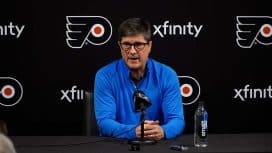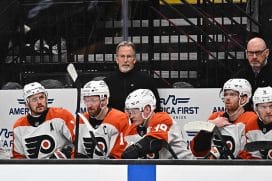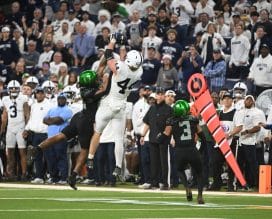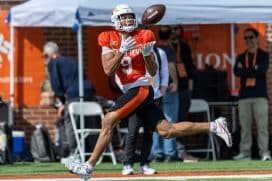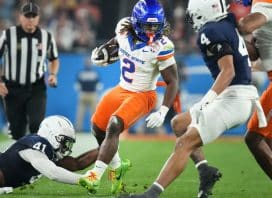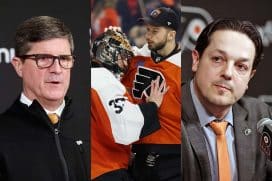Flyers
Flyers ‘New Era’ Becoming Full of Familiar Faces
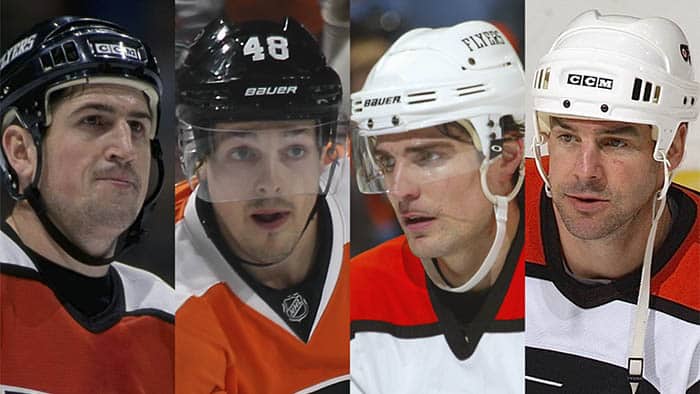
A Flyer forever. It’s a phrase you hear commonly throughout Wells Fargo Center. If you were one of the privileged players who wore an orange and black jersey, you were part of the vision Ed Snider had when he brought a hockey team to Philadelphia in 1967. You were part of the Flyers family.
From the time the Flyers won back-to-back Stanley Cups in 1974 and 1975, the most influential figures of the franchise have been heavily involved. Bobby Clarke had two stints as GM. Bill Barber worked in scouting, then became the head coach, then was a senior advisor. Paul Holmgren rose through the front office ranks, holding essentially every position from head coach to GM to President of Hockey Operations to senior advisor.
For decades, the Flyers have built out their front office and hockey operations departments with these familiar faces. They were involved in player development, scouting, coaching. They held the highest front office positions.
So when the Flyers announced the “New Era of Orange” last month, which coincided with the official removal of the interim tag from Danny Briere as GM and the hiring of Keith Jones as President of Hockey Operations, there were immediately going to be skeptics. These were two former players getting the highest positions in the front office. For a so-called new era, it just felt like more of the same.
The Flyers’ brass knew it too. It’s why Dan Hilferty addressed it early in his first media availability as the future Governor of the team at the “New Era” press conference.
“To alumni near and far, we greatly appreciate your support and loyalty. You never gave up, and neither will we,” Hilferty said. “In selecting two of your fellow alums, be assured the traditions will be honored and determination will be the hallmark of this team.
“I know some people are thinking ‘here they go again, hiring two former Flyer players isn’t a fresh start.’ Let me share with you that during the process, our goal was to hire the two best candidates. It just happens that they’re former Flyers. We were inspired by the titans who won us championships in 1974 and ‘75. We need to channel the spirit of those early years as we build anew. Equally, we need to embrace today’s modern game, one that requires speed, power, and strategy like never before.”
Head coach John Tortorella is the outsider of this group. Upon being hired last offseason, he entered with no prior history with the organization. Tortorella is often leaned upon to be a messenger of sorts. He can get the point across emphatically and with no filter. He made his thoughts on the former Flyer discussion known during this press conference as well.
“I don’t want to speak out of turn, but I don’t get sometimes in this process when people start talking about Flyers, alumni, Jonesy, an ex-Flyer, Danny, an ex-Flyer, what has happened? Why do people think that they’re diseased?” Tortorella said. “If you’re an ex-Flyer and you come from the organization that you shouldn’t be in this organization, that we need to look outside?
“I’m not sure who said it here, but it’s the person you’re looking at. I’m proud that they are Flyers. I’m proud of these guys over here, and other alumni that care about this organization. That’s what thrills me the most. I think we have strong personalities and I think they care, and I don’t get some of the thinking out in this city. ‘Oh, it’s an ex-Flyer again, they’re doing it the same way.’ God damn. It is so important to have that belief. I’m thrilled.”
In the weeks since, the Flyers made changes that were indicative of a new era. It may be two ex-Flyers running the show at the highest level, but with the belief that the senior advisor group was no longer as influential as in the past and an overhaul of the player development staff that also had former players, it showed a recognition of things needing to be changed and fixed.
This week, the Flyers went back to the well of former players. Patrick Sharp and John LeClair were brought in as Special Advisors to Hockey Operations.
Sharp may be a former Flyer, but only played in 66 NHL games in Philadelphia before experiencing his biggest success in Chicago. That’s not the traditional former Flyer hiring that is best known for his time in Philadelphia, and those types of hires don’t nearly fit the narrative the same way.
LeClair, on the other hand, was much more of that old-school hiring. A defining player of the 90s Flyers, part of the Legion of Doom, a three-time 50-goal scorer, LeClair was a star in Philadelphia, playing 10 of his 16 career seasons here.
So the Flyers front office now consists of two former players at the top – Jones as President of Hockey Operations and Briere as GM – with Sharp and LeClair in advisory roles, and Tortorella both coaching and having equal investment in the organization from the front office side, being part of the key discussions about the path to rebuilding the team. The names may be different, but the pedigree is the same.
It’s already a running joke on social media, and it only continued with the two hirings this weekend. When you consider that prior to hiring Jones, former players Eric Lindros, Scott Mellanby, and Robert Esche were all at least linked to the Flyers’ search, you start to see why it makes for such an easy target of tomfoolery. It feels like a bit, and you have to admire just how committed the Flyers are to it.
This is hardly something exclusive to the Flyers. Teams across the league tend to hire former players for a variety of reasons, but it is heavily rooted in the same philosophy. Players who once wore the jersey and gave blood, sweat, and tears for the franchise understand more than anyone what it means to be in the locker room, what it means to succeed with the franchise, what it means to the city when they do. So when things start to go off the rails, as they have for the Flyers in the last decade, you tend to look to your roots, the foundational elements of what brought you success in the first place.
In the Flyers’ case, the common theme is that what was once a proud organization, what was once a place that everyone wanted to play for and nobody wanted to play again has lost its way. It has lost the very essence that made hockey in Philadelphia much more than just a footnote on the current sports landscape.
Jones only played three seasons in Philadelphia, but experienced what a run to the Eastern Conference Final can do to the fans. Briere saw the same multiple times, including the magical 2010 Stanley Cup Final run. Sharp got a taste of it, coming up with the team during the 2003-04 season, where the team also reached the conference finals, and in the lockout year of 2004-05, when the Philadelphia Phantoms captured the AHL’s Calder Cup. LeClair made the conference finals four times and the Stanley Cup Final once during the Flyers revival in the 90s.
These four figures also have something in common. They were well-liked by the fans.
Jones certainly became beloved for his personality that fit broadcasting so well once his playing career was over. Briere and LeClair embodied what it means to be Flyers on the ice. Sharp was often viewed as one that got away after being traded to Chicago in 2005. All of them are putting that on the line in an effort to make the Flyers the respected and revered franchise they once were.
It is more of a gamble by the Flyers on their front office hirings and the pursuit to bring the franchise back to glory, and there’s no in-between on the results.
It could work tremendously and the Flyers could stick it to the very vocal contingent of fans that believe this is nothing more than the “old boys club” at work once again. They could also just as easily be proven right about this being more of the same.
